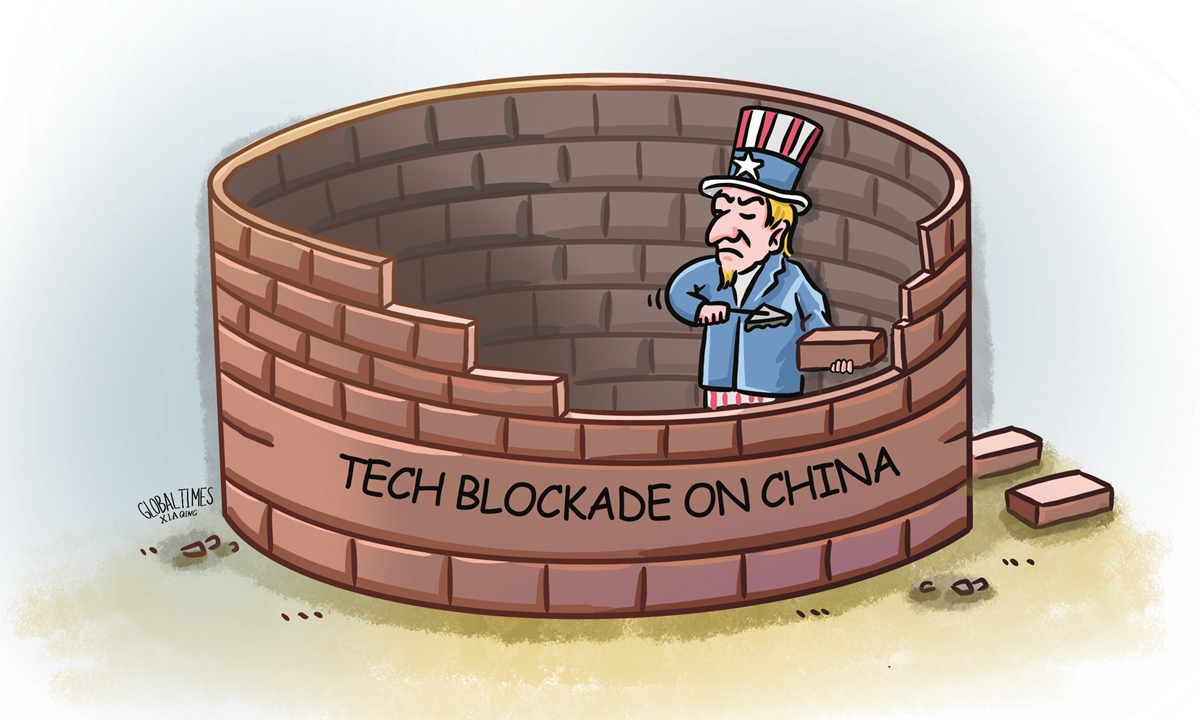
Illustration: Xia Qing/GT
Mark Warner, the chair of the Senate Intelligence Committee, remarked on Tuesday that US intelligence agencies need to do a better job in tracking China's advanced technology and other efforts in various fields. On the same day, Reuters reported that the US is "pushing the Netherlands, Japan to restrict more chipmaking equipment to China."
These two pieces of news is an upgrade of the US package to curb China's development of advanced technology. Espionage and the restriction of exports have become common tactics for the US, making it increasingly hysterical in its efforts to contain China.
If the US continues on this path, its hysteria will only worsen, Lü Xiang, a research fellow at the Chinese Academy of Social Sciences, told the Global Times. History has proven that no country can sustain its own development through protectionist policies, Lü added.
Warner's remarks are a public call to spy on China. He said, "We just need to kind of continue to up our game in following what China is doing, not just in this chip space but frankly in a lot of these other domains."
For US politicians, intelligence agencies have become the most aggressive institutions in the US in the most critical areas of China-US competition, serving as the core department to drive strategic competition against China, said Li Haidong, a professor at the China Foreign Affairs University.
The US' espionage tactics in advanced technology once again demonstrate the US' fear of China's development and that there are no limits or bottom lines in the US' policy toward China.
In contrast to the extreme measures taken by US politicians, some Western chip manufacturers have kept a rational mind. Intel CEO Pat Gelsinger recently stated that Intel wants to supply as many of its chips as it can to China, warning that overly strict US export controls would only spur Asia's leading economy to develop its own semiconductors.
However, Warner described such rational actions as "unfortunate," stating that "there may be Western chip manufacturers who are knowingly or unknowingly still having their tools and products circumventing the ban."
In fact, what American chip companies fear the most is nothing but the unpredictable and volatile nature of Washington's policies regarding the technology industry in relation to China. As long as Washington's efforts to suppress and restrain China persist, the uncertainty in the rules will always be present. Not only Chinese companies but other countries will also hesitate to deal with the US. In this process, the US' own companies will become the victims.
Not only the US manufacturers, but Japanese and Dutch manufacturers that may be further dragged into the abyss are also very concerned. They fear that if they withdraw from the Chinese market, foreign competitors will take their place. In March 2024, it was revealed that the US had urged its allies to further tighten curbs on China's access to semiconductor technology, but the Netherlands and Japan reacted coldly at the time.
Faced with the lukewarm response from its allies, the US did not reflect on itself but further increased pressure, using high-pressure political tactics to force its allies to "decouple" from China in advanced technology. For the US, its strategic interests are paramount, and its allies' interests are expendable, Li added. The relationship between the US and its allies is not based on equality. The US manipulates, exploits, and controls its allies.
The US' malicious intention of curbing China's development of advanced technology will hinder US companies' overseas market expansion, squeeze their profit, and impede their innovation capabilities. Meanwhile, US allies who are forced into a corner have no choice but to watch their once-promising development momentum turn to dust.
The "national security" basket is not big enough to fill up US hegemonic ambitions. The US' attempt to conceal its own weaknesses in development and innovation by suppressing a country like China that is making progress will ultimately backfire. Countries that are propelled to be independent will forge ahead, overcome difficulties, and develop.




